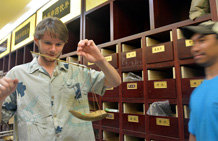
Q&A About Middle East Respiratory Syndrome
Source: en.nhfpc.gov.cn
Updated: 2015-06-03
The following advice aims to reduce risks of viral infection of travelers and travel workers (including transportation and ground service personnel), and strengthen self-reporting of traveler’s disease.
Travelers with major diseases, such as diabetes, chronic pulmonary disease and immunity deficiency, should be informed of their risks of getting sick, including suffering the MERS.
Inform outbound travelers of general health precautions, including influenza and travellers’ diarrhea to bring down risks of infection. Focus should be placed on frequent hand washing with soap and clean water (rub hands if there's no obvious filth), as well as use of quality food, clean fruits and vegetables, and no undercooked or unclean food. Good personal hygiene should be maintained.
Provide all travel groups to the Middle East with useful health information, and put these materials in important places, such as travel agencies or departure points. Several modes of transmission should be applied, such as broadcasting health information on airplanes or ships, using banners and brochures, or displaying bulletins at international ports of entry. Travel advisory information should include the latest information on MERS-CoV.
Travelers exhibiting acute respiratory disease, with fever and cough (severe enough to interfere with daily activities) should reduce contact with others, cover their mouth and nose with tissue when coughing or sneezing, throw used tissues in trash and wash hands. If tissue is not around, use sleeves instead of hands, and report to medical personnel as soon as possible.
Travelers suffering obvious acute respiratory diseases, with fever and cough (severe enough to interfere with daily activities) after two weeks back from the Middle East, should go to the doctor immediately and report to local health departments.
People who have close contact with travelers suffering obvious acute respiratory diseases, with fever and cough (severe enough to interfere with daily activities) back from the Middle East should report to local health departments and receive MERS-CoV tests if they exhibit similar symptoms.
Alert medical staff and medical institutions about travelers returned from the Middle East and suffering acute respiratory illness, especially fever, cough and lung organic diseases (such as pneumonia or acute respiratory distress syndrome). If clinical symptoms indicate possibilities of MERS, MERS-CoV lab tests should be carried out in accordance with WHO's case definitions. Infection prevention and control measures should also be applied. Clinicians should also be aware of atypical manifestations from patients with immune dysfunction.
All countries should take general measures in accordance with the requirements of the International Health Regulations, to evaluate sick travelers on traffic tools (such as airplanes and ships) and port of entry. Suspicious cases should receive safety treatment and be sent to hospitals or appointed institutes for clinical evaluation and treatment. If patient were on an airplane, passengers’ positioning forms can be used to collect the patient's contact information for future follow-up visits.

World Family Summit
The World Family Organization was founded in Europe in 1947 and headquartered in Paris.
Link: China's Central Government / World Health Organization / United Nations Population Fund / UNICEF in China
Copyright 2014 National Health and Family Planning Commission of the PRC All rights reserved






